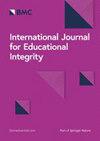Critical thinking, assessment, and educational policy in Palestinian universities
IF 6.9
Q1 EDUCATION & EDUCATIONAL RESEARCH
International Journal for Educational Integrity
Pub Date : 2024-08-05
DOI:10.1007/s40979-024-00160-9
引用次数: 0
Abstract
This study examines the relationship between critical thinking and grades at the tertiary level, focusing on their social, political, and ethical implications. Employing a mixed-methods approach, this study combines survey data collection with in-depth interviews to generate comprehensive insights into the complex relationship between critical thinking and grades. The survey targets 173 faculty members, while the interviews focus on seven selected academic staff members from Palestinian universities, enabling a comprehensive understanding of the research objectives. Results showed that grades often hinder critical thinking skills and creativity, leading to rote memorization and limited creativity. The study also highlights the political implications of grades, as standardized testing influences education policies and curriculum decisions. Faculty members expressed criticism of the prioritization of grades, citing conventional evaluation methods, temporal limitations, and resource constraints. As critical thinking is crucial for comprehensive student development, contributing to problem-solving, decision-making, creativity, innovation, effective communication, and active citizenship, the study proposes diverse approaches to strike a balance between valuing grades and nurturing critical thinking abilities. By fostering critical thinking abilities, Palestinian students can enhance their preparedness for academic pursuits, personal growth, and societal contributions.

巴勒斯坦大学的批判性思维、评估和教育政策
本研究探讨了批判性思维与高等教育成绩之间的关系,重点关注其社会、政治和伦理影响。本研究采用混合方法,将调查数据收集与深入访谈相结合,以全面了解批判性思维与成绩之间的复杂关系。调查对象为 173 名教职员工,而访谈的重点则是巴勒斯坦各大学选定的七名教职员工,从而全面了解研究目标。结果表明,成绩往往会阻碍批判性思维能力和创造力,导致死记硬背和创造力受限。研究还强调了成绩的政治影响,因为标准化考试影响着教育政策和课程决策。教职员工以传统评价方法、时间限制和资源制约为由,对分数优先表示了批评。由于批判性思维对学生的全面发展至关重要,有助于解决问题、决策、创造力、创新、有效沟通和积极的公民意识,因此本研究提出了多种方法,以在重视成绩和培养批判性思维能力之间取得平衡。通过培养批判性思维能力,巴勒斯坦学生可以为学术追求、个人成长和社会贡献做好更充分的准备。
本文章由计算机程序翻译,如有差异,请以英文原文为准。
求助全文
约1分钟内获得全文
求助全文
来源期刊

International Journal for Educational Integrity
EDUCATION & EDUCATIONAL RESEARCH-
CiteScore
6.90
自引率
26.10%
发文量
25
审稿时长
22 weeks
 求助内容:
求助内容: 应助结果提醒方式:
应助结果提醒方式:


